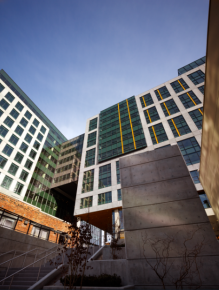
Is Amazon as involved as it should be in Seattle? How involved is that? And how much does it matter?
These questions have become the talk of the tech town after a special report in The Seattle Times put Amazon’s local involvement, or lack thereof, in the spotlight. The report sparked debate not just over its driving question — whether the tech giant’s local presence meets an acceptable standard — but whether it should, and whether we all agree on what that standard is in the first place.
Spoiler alert: we don’t. Reaction from geeks has run the gamut from calls for Amazon play a bigger role in local affairs to louder, wait-just-a-minute assertions that the company’s booming business presence, employee base and growing downtown footprint is contribution enough, and who are we to demand more?
But in a tech space where inspiration, connections and behind-the-scenes support circulates more widely than dollars, geeks who think Amazon could step it up zeroed in on one area of civic life where Amazon is noticeably AWOL — the local marketplace of ideas.
To them, Amazon doesn’t have to pay up. Just show up.
“Why not share the wisdom?” entrepreneur and patent attorney Adam Philipp asked on a Facebook thread on the topic. Amazon employees rarely if ever show up on speaker lineups at local tech events and conferences, an absence that’s not gone unnoticed.
“Amazon’s problems are far deeper than their parsimonious attitude towards local not-for-profits. They just don’t want to engage,” developer and designer Dylan Wilbanks wrote in a comment on a previous GeekWire post.
To Nadia Mahmud, CEO of tech nonprofit Jolkona, which connects the smallest potential donors to philanthropic opportunities around the world, Amazon’s relative absence from local tech events leaves the company in a poor position to do something she believes is “extremely important and critical” for it to do — make a lasting impact in its area.
“I attend conferences and networking events all the time and notice other large Northwest technology companies being catalysts for social innovation through event and conference sponsorships, but have yet to see that level of commitment and support from Amazon,” she wrote via email.
Look closely at goings-on in the local event space and you might see, as I have, a handful of Amazon employees who tip-toe outside the company norm to speak and engage at local events. They’ll do it. Just very, very carefully.
Bryan Zug, a strategist and producer who co-organizes the popular Ignite Seattle event series, runs his business across the street from one of the newer buildings in Amazon’s expanding South Lake Union campus. He shared his take on Amazon’s involvement at the Uptown Espresso on Westlake, a popular neighborhood meeting spot.

Zug goes to his fair share of camps, meetups, mixers, networking events and conferences around town, and the Amazon employees he typically sees show up, shake hands or present, he says, are people from Amazon’s Web Services division who look to recruit top talent.
“You don’t really see Amazon showing up in any other way, so my question to them is, ‘How much do you care about the community you’re in?'” Zug said.
Amazon’s recent purchase of blocks in upper Belltown will mean that the King Cat Theater, which has played host to Ignite for a couple years now, will be forced to shut down in May. Zug has heard that Amazon’s blueprint includes plans for a large theater space, a 2,000-person auditorium, in fact, but Amazon has said it has not decided whether the space will be made available for use by the community.
That brings up an interesting point. As Amazon expands its physical presence both in South Lake Union and, soon, downtown, it’s more likely that its posture toward the local idea economy — will it let ideas flow through it, or only around it? — will begin to influence or even shape those defining conversations.
“The issue is, who is Seattle meant to be, and how do we become that?” Zug said. Figuring that out “requires everyone from startups and independent entrepreneurs to big businesses. It requires everyone’s involvement. To have a major player not show up, it’s sort of a deafening silence.”
And yet, it’s tough to walk around South Lake Union and not be within earshot of one of the thousands of Amazon employees who spend their workdays inside the company’s unbranded buildings and out on the neighborhood’s now buzzing streets.
It’s tough, too, not to appreciate that despite its conversational isolation, Amazon already has shown up — right in the middle of Seattle.
“Is not locating the headquarters in the heart of the city not the ultimate community move?” Emily Chen, who works across the street from Zug, TechStars, Founder’s Co-Op, BigDoor and others in Amazon’s Fiona building, wrote on the Facebook thread.
“I (and other Amazon employees) actually support the local economy during our lunch breaks. And! Hiring! When so many other companies have been trying to save money by laying people off. That’s the best way to support a community.”
What do you think: has Amazon “shown up” enough? Let us know your thoughts in the poll and in the comments.
Update: The spelling of Adam Philipp’s name has been corrected in the story.



